There are many different parts to a trailer hitch, and each one serves a different purpose.
Here is a rundown of the most important parts of a trailer hitch, so you can be sure your rig is properly equipped for towing.
Parts Of A Trailer Hitch Diagram
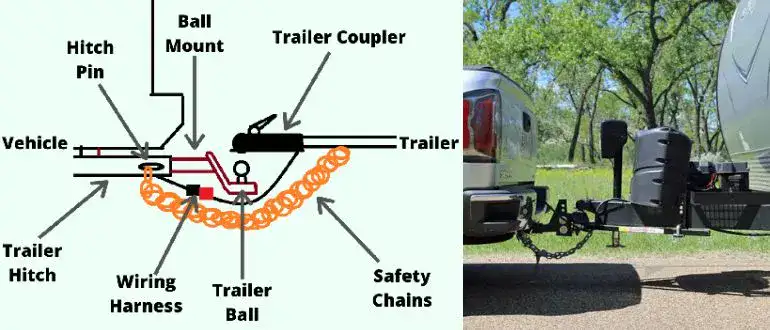
Trailer Hitch Parts Names:
- Trailer ball
- Hitch mount / Ball Mount
- Safety chain loops
- Trailer coupler
- Coupler latch
- Trailer wiring
- Hitch pin
Trailer Ball:
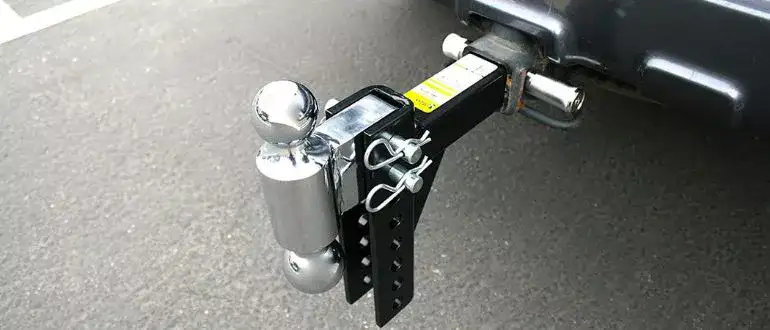
The trailer ball is the connecting point between your vehicle and the trailer.
It is made up of a metal ball and a threaded shank or stem, and it is connected to the trailer coupler.
The trailer ball allows you to turn corners and travel smoothly over bumps and hills.
Hitch mount / Ball mount:
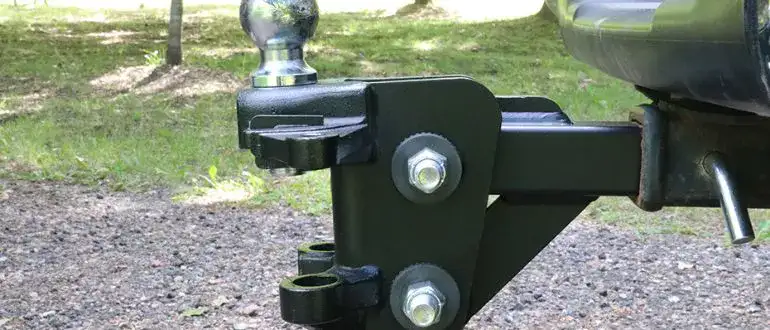
The hitch mount, also known as the ball mount, is the part of the trailer hitch that holds the trailer ball.
It is inserted into the hitch receiver tube and secured with a hitch pin or hitch lock. The hitch mount can be fixed or adjustable.
Safety chain loops:
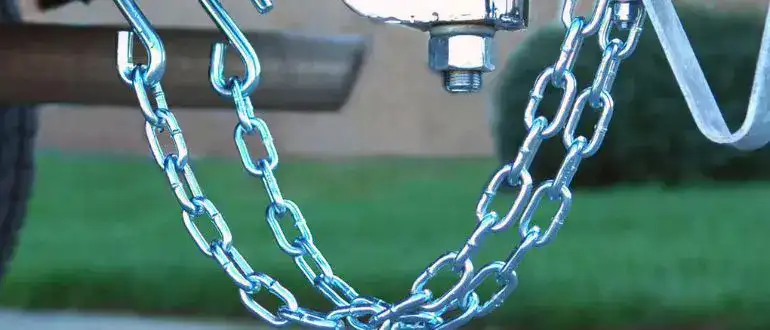
Safety chain loops are used to connect the safety chains to the trailer tongue.
They are typically made of metal and have a hook or loop on one end that attaches to the safety chain, and a bolt or ring on the other end that attaches to the trailer tongue.
Trailer Coupler:
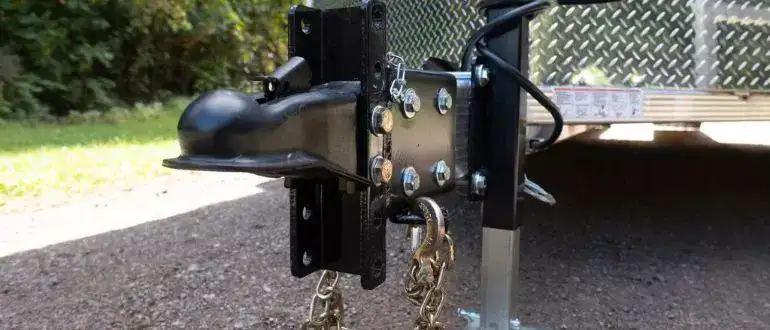
The trailer coupler is the part of the hitch that connects the trailer tongue to the trailer ball.
It is made up of a coupler body and a coupler latch.
The coupler body is the part that attaches to the trailer tongue, and the coupler latch is the part that secures the coupler to the trailer ball.
Coupler latch:
The coupler latch is the part of the trailer coupler that secures it to the trailer ball.
It is typically made of metal and has a spring-loaded latch that opens and closes to allow the coupler to be connected and disconnected from the trailer ball.
Trailer Wiring:
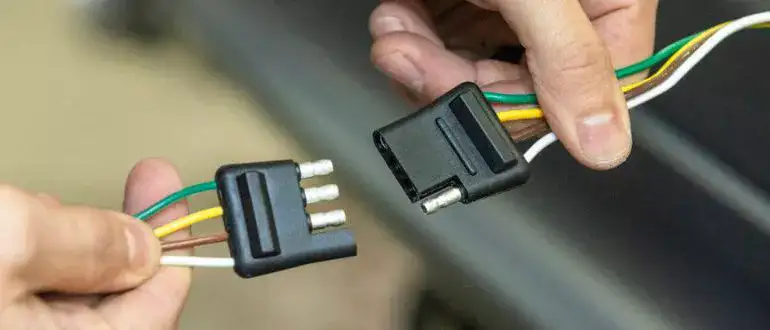
Trailer wiring is used to connect the trailer lights to the vehicle’s electrical system.
It typically consists of a 4-way flat connector, which provides power for the taillights, brake lights, turn signals, and auxiliary power.
Trailer wiring can also be used to connect trailer brakes and auxiliary power.
Hitch Pin:
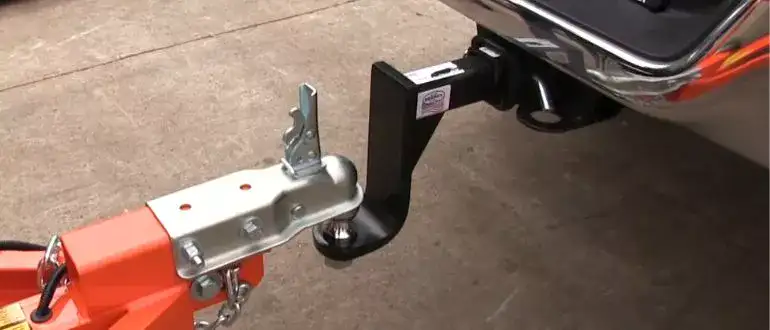
The hitch pin is a small metal rod that keeps the ball mount shank and other trailer hitch parts from sliding out of the hitch receiver tube.
It is typically bent in an “L” shape and designed to insert into the side of the hitch receiver, pass through the ball mount shank, and come out the other side.
The hitch pin also has a hole on the end to accept a hairpin-shaped clip, which keeps the pin retained in the receiver.
Other Trailer Hitch Parts:
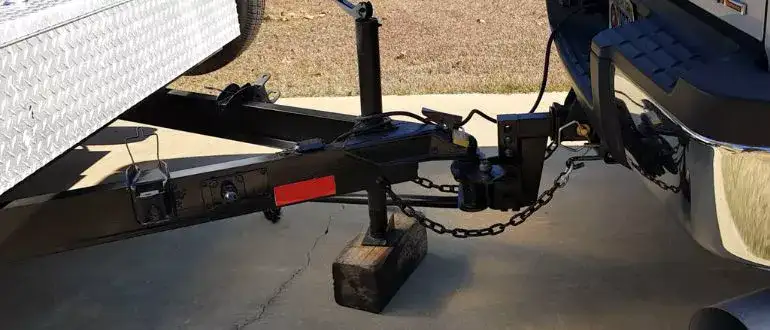
There are also other trailer hitch parts that can be used to enhance your towing experience, such as:
Hitch covers:
Hitch covers protect the hitch receiver from dirt and debris. They also give your rig a finished look.
Hitch steps:
Hitch steps make it easy to access the roof of your vehicle or trailer.
They typically bolt onto the hitch receiver and have a step on one end that folds down when not in use.
Hitch mounts with storage:
Some hitch mounts come with built-in storage compartments for holding trailer wiring, hitches, ball mounts, and other towing accessories.
This can be a convenient way to keep everything organized and within reach.
Hitch lights:
Hitch lights are used to illuminate the trailer hitch and make it easier to see at night.
They typically mount on the hitch receiver or ball mount and have a light on each side.
Trailer Hitch Types:
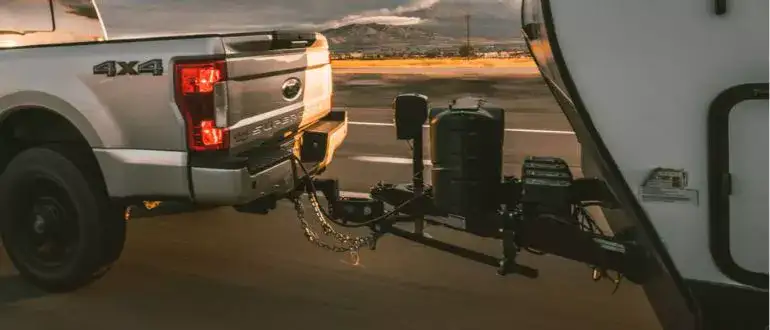
There are three main types of trailer hitches: receiver hitches, fifth wheel hitches, and gooseneck hitches.
Receiver hitches:
Receiver hitches are the most common type of hitch and are typically used for towing trailers, campers, and RVs.
They mount on the vehicle’s frame and have a receiver tube that accepts a ball mount, cargo carrier, or other hitch-mounted accessory.
Fifth wheel hitches:
Fifth wheel hitches are designed for towing larger trailers, such as fifth-wheel trailers and toy haulers.
They mount on the vehicle’s frame and have a kingpin that couples with a special fifth-wheel hitch mounted in the bed of the truck.
Gooseneck hitches:
Gooseneck hitches are designed for towing gooseneck trailers.
They mount on the vehicle’s frame and have a gooseneck coupler that couples with a special gooseneck hitch mounted in the bed of the truck.
How To Ensure Your Trailer Hitch Is Properly Equipped For Towing:
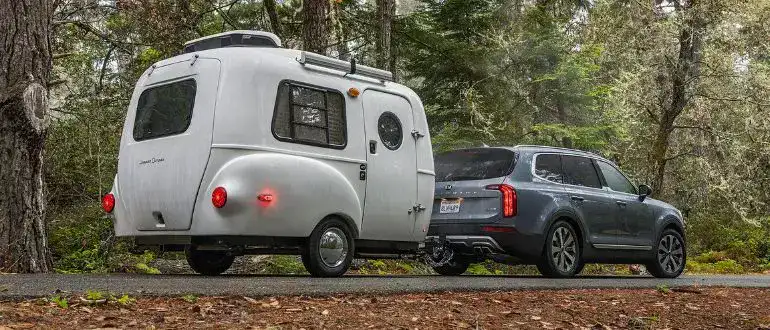
In order to ensure your trailer hitch is properly equipped for towing, you will need to determine the following:
What type of hitch do I need?
The type of hitch you need will depend on the type of trailer you are planning to tow. If you are unsure, consult with a qualified mechanic or trailer dealer.
What size hitch do I need?
The size of hitch you need will depend on the weight of the trailer and the tongue weight. Tongue weight is the downward force exerted on the hitch by the trailer.
How much weight can my vehicle tow?
Your vehicle’s towing capacity is determined by its Gross Vehicle Weight Rating (GVWR).
The GVWR is the maximum weight of the vehicle, including passengers, cargo, and trailer.
You will also need to factor in the weight of any other items that will be on or in the vehicle, such as camping gear, luggage, etc.
Your vehicle’s owner’s manual should have a section that lists the GVWR and other important information related to towing.
If you cannot find this information, consult with your dealership or a qualified mechanic.
What Is The Tongue Weight Of My Trailer?
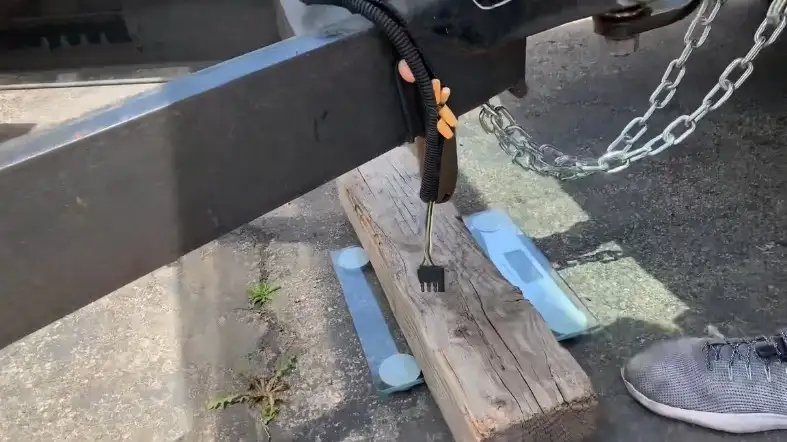
The tongue weight of your trailer is the downward force exerted on the hitch by the trailer. It is typically 10-15% of the total weight of the trailer.
You can find the tongue weight of your trailer by checking the manufacturer’s specifications or by weighing the trailer with a tongue weight scale.
What size hitch ball do I need?
The size of hitch ball you need will depend on the size of the trailer coupler. The coupler is the part of the trailer that couples (connects) to the hitch ball.
The most common sizes are 1-7/8″, 2″, and 2-5/16″.
You can find the size of your trailer coupler by checking the manufacturer’s specifications or measuring the inside diameter of the coupler with a ruler or tape measure.
What is the Gross Trailer Weight Rating (GTWR)?
The Gross Trailer Weight Rating (GTWR) is the maximum weight of the trailer, including its contents.
You can find the GTWR of your trailer by checking the manufacturer’s specifications or weighing the trailer with a trailer weight scale.
What is the payload capacity of my vehicle?
The payload capacity of your vehicle is the maximum weight of the passengers, cargo, and trailer combined.
Your vehicle’s payload capacity is determined by its Gross Vehicle Weight Rating (GVWR).
The GVWR is the maximum weight of the vehicle, including passengers, cargo, and trailer.
You can find the payload capacity of your vehicle by checking the manufacturer’s specifications or your vehicle’s owner’s manual.
What is the trailer axle weight rating (TAWR)?
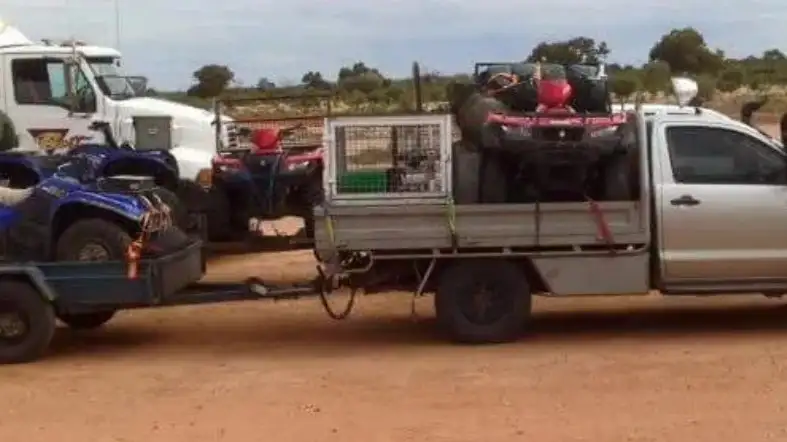
The trailer axle weight rating (TAWR) is the maximum weight that can be carried by one axle of the trailer.
You can find the TAWR of your trailer by checking the manufacturer’s specifications or weighing the trailer with a trailer axle weight scale.
When towing a trailer, it is important to keep the following in mind:
1. The total weight of the trailer and its contents should not exceed the Gross Trailer Weight Rating (GTWR).
2. The tongue weight of the trailer should not exceed the Tongue Weight Rating (TWR).
3. The combined weight of the passengers, cargo, and trailer should not exceed the payload capacity of the vehicle.
4. The weight on each axle of the trailer should not exceed the Trailer Axle Weight Rating (TAWR).
Why it is important to maintain your trailer hitch? Top 10 Reasons:
There are several reasons why it is important to maintain your trailer hitch. Here are the top 10 reasons:
1. To ensure safety while towing
2. To prevent wear and tear on your vehicle
3. To prolong the life of your trailer hitch
4. To maintain the value of your trailer hitch
5. To keep your trailer hitch looking its best
6. To avoid rust and corrosion
7. To prevent damage to your trailer
8. To prevent damage to your vehicle
9. To avoid accidents
10. To avoid citations from law enforcement
Ensure safety while towing:
Safety is the most important reason to maintain your trailer hitch.
A properly functioning hitch will ensure that your trailer stays connected to your vehicle while you are driving.
Prevent wear and tear:
Wear and tear on your vehicle can be greatly reduced by maintaining your trailer hitch.
Properly attaching and securing your trailer will help to prevent putting unnecessary stress on your vehicle’s suspension and tires.
Prolong The Life Of Your Trailer Hitch:
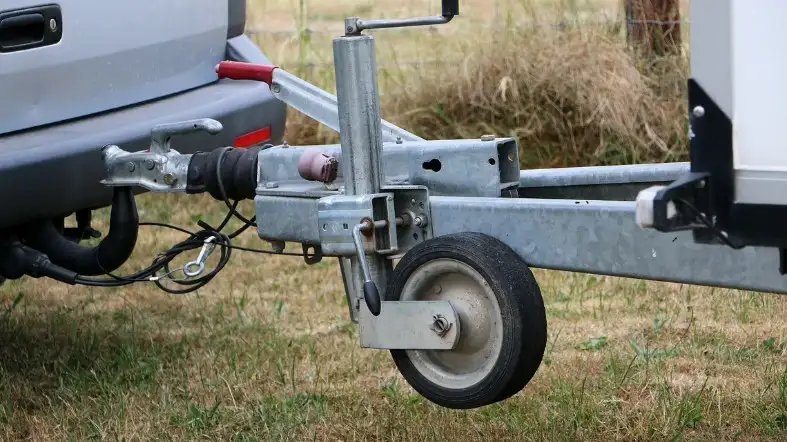
Regularly maintaining your trailer hitch will help to prolong its life. This is especially important if you use your hitch frequently.
Inspecting it for damage and rust regularly will help to ensure that it lasts for many years.
Maintain the value of your trailer hitch:
If you ever decide to sell or trade-in your trailer hitch, its value will be significantly reduced if it is not maintained properly.
Keep your trailer hitch looking its best:
A well-maintained trailer hitch will look much better than one that is neglected. Regularly cleaning and inspecting it for damage will help to keep it looking like new.
Avoid rust and corrosion:
Rust and corrosion can quickly damage a trailer hitch. Inspecting it regularly for signs of rust will help to prevent this from happening.
Applying a coat of Rustoleum or another similar product will also help to protect your hitch from corrosion.
Prevent Damage To Your Trailer:
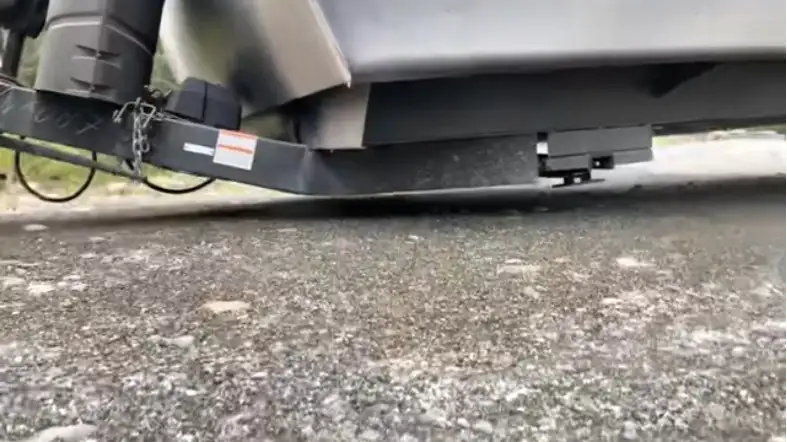
If your trailer hitch is not properly secured, it could come loose while you are driving.
This could cause serious damage to your trailer and anything that is inside of it.
Prevent damage to your vehicle:
An improperly secured trailer hitch can also cause damage to your vehicle.
If the hitch comes loose, it could collide with the bumper or rear end of your vehicle, causing expensive repairs.
Avoid accidents:
One of the most important reasons to maintain your trailer hitch is to avoid accidents.
A properly functioning hitch will help to keep your trailer connected to your vehicle, preventing it from becoming detached and causing an accident.
Avoid citations from law enforcement:
If you are pulled over while driving with a trailer, the officer may inspect your hitch to make sure that it is properly secured. If it is not, you could be cited for a violation.
Conclusion
Now you know the different parts of a trailer hitch and why it is important to maintain it.
By regularly inspecting and cleaning your hitch, you can help to ensure its longevity and avoid costly repairs.
